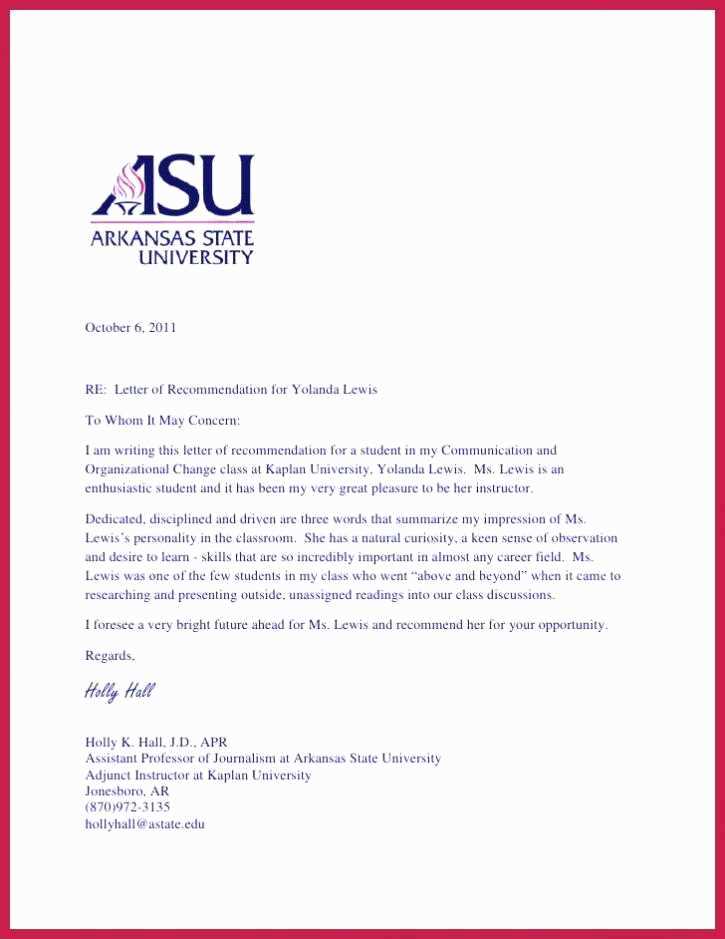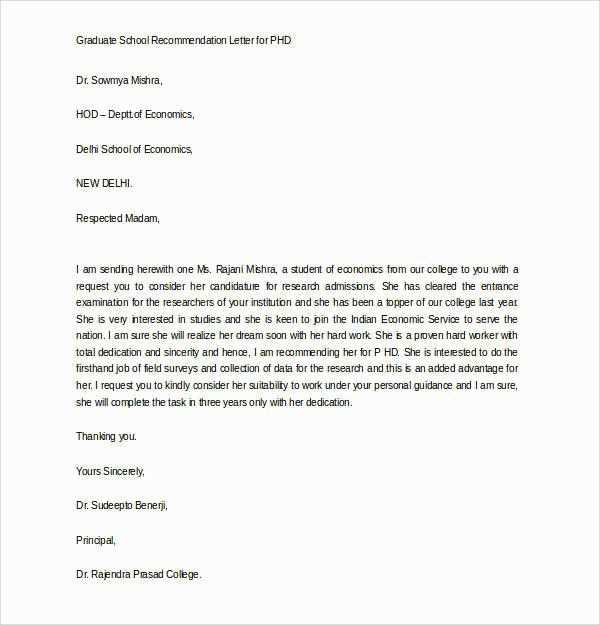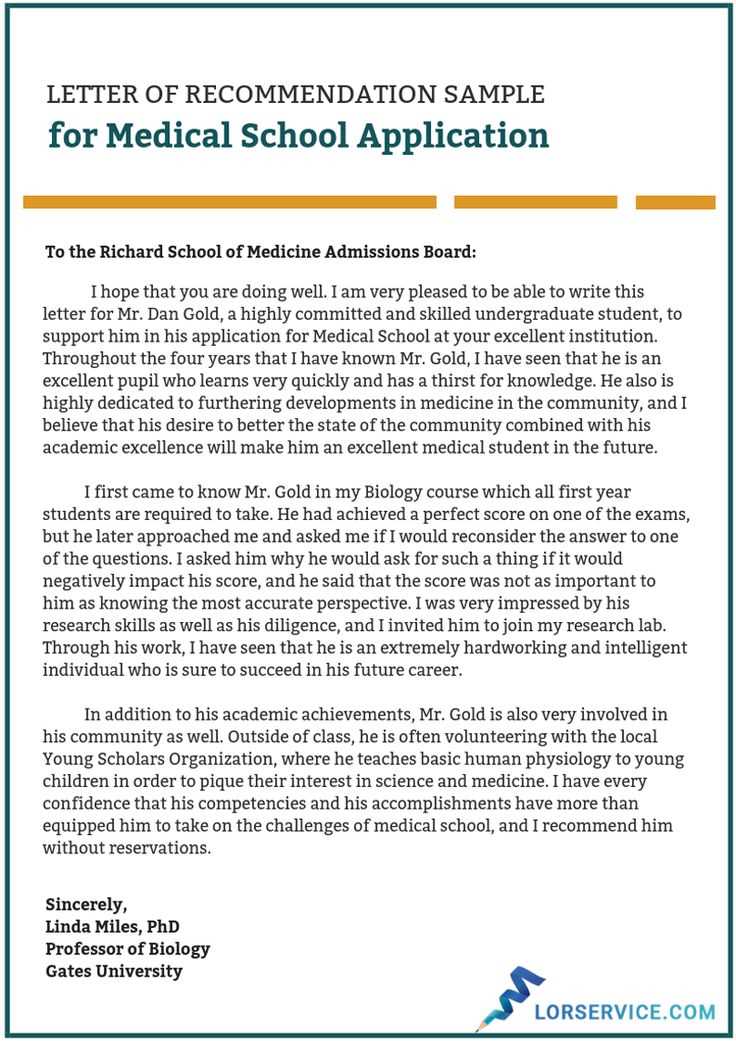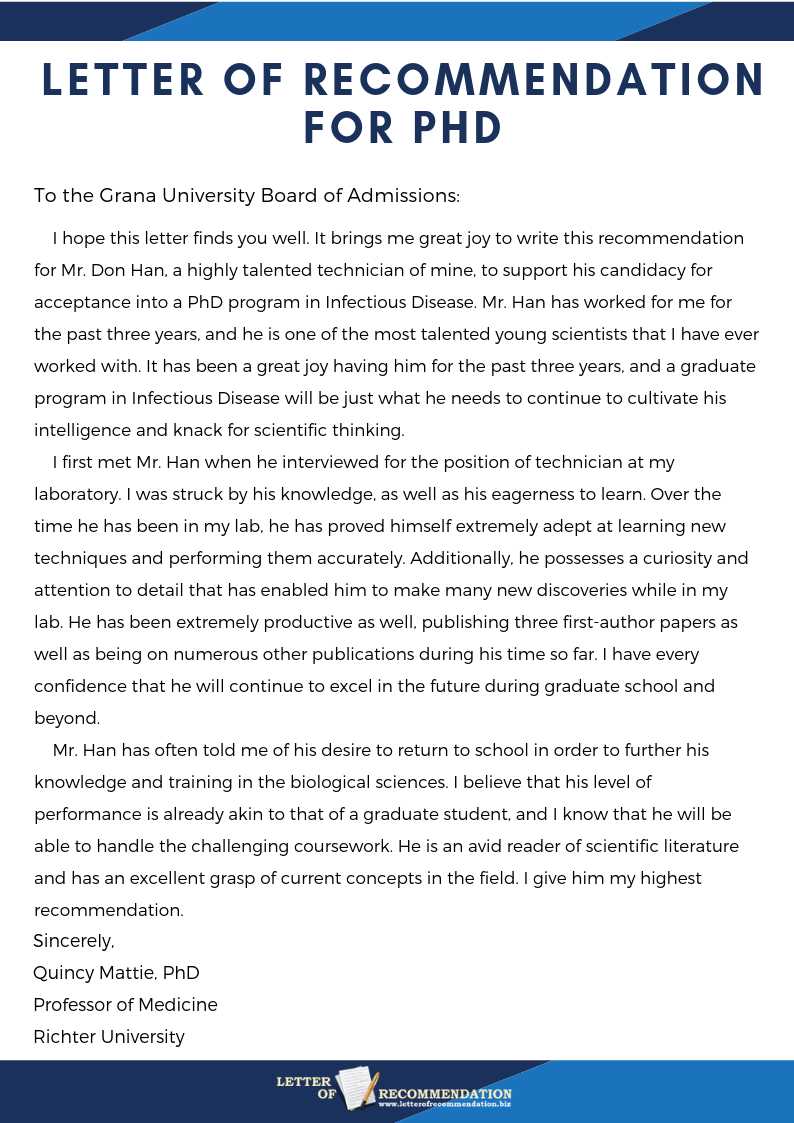Letter of recommendation template phd

When writing a letter of recommendation for a PhD applicant, focus on providing specific examples of the candidate’s academic achievements, research abilities, and potential for future success. Highlight their skills, such as critical thinking, analytical abilities, and capacity for independent work. Referencing tangible accomplishments, like publications or research projects, can provide strong evidence of their qualifications.
It’s important to outline how the applicant’s work aligns with the program’s objectives and the specific strengths they bring to the academic community. Make sure to include details on their work ethic, intellectual curiosity, and how they contribute to the field. A personal example of their perseverance or innovative approach can demonstrate their suitability for a rigorous PhD program.
Lastly, a strong recommendation will include a brief section that speaks to the applicant’s character. While academic ability is paramount, an endorsement that acknowledges their personal qualities, such as integrity, teamwork, and communication skills, will present a well-rounded view of the candidate. This helps the admissions committee see how they will fit into the program and contribute to a positive academic environment.
Letter of Recommendation Template for PhD
To whom it may concern,
I am pleased to recommend [Student’s Name] for admission to your PhD program in [Field of Study]. I had the privilege of working with [Student’s Name] as their [Professor, Supervisor, etc.] during their [time as an undergraduate/graduate student] at [University Name]. Over the course of our interactions, I found [Student’s Name] to be an exceptionally capable and dedicated individual.
[Student’s Name] consistently demonstrated strong analytical abilities, a deep understanding of the subject matter, and an unwavering commitment to excellence in all their academic pursuits. Their research work, particularly [mention specific project or thesis], showcased their ability to approach complex problems with a fresh perspective and resolve them with precision. [Student’s Name] displayed a high level of independence and creativity, essential for success in a doctoral program.
Beyond technical skills, [Student’s Name] exhibited excellent communication and teamwork abilities. They contributed thoughtfully in class discussions, often bringing new insights that enhanced the learning experience for peers. [Student’s Name] also worked closely with fellow students on group projects, where they demonstrated leadership and collaboration skills.
I am confident that [Student’s Name] will excel in your PhD program, bringing both passion and expertise to their research. They possess all the qualities necessary to contribute meaningfully to the academic community and advance the field of [Field of Study].
If you require any further information, please do not hesitate to contact me at [Your Contact Information].
Sincerely,
[Your Name]
[Your Position]
[University Name]
| Section | Content |
|---|---|
| Student’s Name | [Student’s Name] |
| Field of Study | [Field of Study] |
| University Name | [University Name] |
| Research Project | [Specific Project/Thesis] |
| Your Contact Information | [Your Contact Information] |
Key Elements to Include in a PhD Recommendation
Begin with a clear statement of how long and in what capacity you’ve known the candidate. This helps establish your credibility as a reference.
Academic Strengths and Skills
Highlight the candidate’s academic performance, including their grasp of subject matter and ability to engage with complex research. Mention any specific skills that stand out, such as critical thinking, problem-solving, or innovation in their field of study.
Research Abilities
Provide specific examples of their research contributions. Discuss any projects, experiments, or papers they’ve worked on, along with their role and the impact of their work. Include details about their capacity for independent work, collaboration, and creativity in problem-solving.
Character and Work Ethic
Describe the candidate’s dedication, perseverance, and ability to manage time effectively. Focus on their commitment to academic growth and how they handle challenges. A mention of their teamwork skills and ability to collaborate with peers and faculty adds value to their profile.
Potential for Future Success
Offer your assessment of the candidate’s potential in their field. Refer to their growth, work ethic, and the trajectory they have demonstrated in previous academic projects. Provide a clear and honest prediction of their future success in a PhD program.
Final Recommendation
Conclude with a strong recommendation. State whether you believe the candidate will thrive in a PhD program and contribute to the academic community. Keep your closing concise but emphatic, reflecting your confidence in their abilities.
How to Describe Academic Achievements in a Letter

Highlight specific accomplishments using quantifiable data. Instead of general statements, provide examples such as “increased research publication count by 30%” or “completed a project with a team of 5 under tight deadlines.” These details demonstrate both capability and impact.
Focus on the individual’s contribution to academic projects. Describe their role in research, coursework, or teaching, emphasizing skills like leadership, problem-solving, and initiative. For instance, “led a team that developed a new method for data analysis, which was adopted by the department.” This shows active involvement and expertise.
Include any awards, recognitions, or publications. Be specific about the nature and prestige of the awards, such as “received the Best Paper Award at the International Conference on Machine Learning.” This conveys the peer recognition the individual has earned within their field.
Discuss how the individual’s work has influenced their field or peers. Point out examples like “their thesis was cited by multiple scholars within six months of publication.” This underlines the academic significance of their efforts.
Use language that reflects the applicant’s work ethic. Instead of vague descriptors, offer clear examples of dedication and consistency, such as “devoted 20+ hours per week over six months to independent research.” This conveys reliability and commitment to academic excellence.
Highlighting Research Potential and Skills
During their time in the program, [Student Name] consistently demonstrated a strong ability to analyze complex problems and formulate innovative solutions. Their skill in identifying research gaps and leveraging existing knowledge to build on these areas stands out. For example, in the project on [specific project], [Student Name] not only identified an underexplored aspect of the topic but also designed and executed an experimental approach that yielded meaningful results.
One of their strongest attributes is their ability to synthesize information from a variety of sources and integrate it into a cohesive framework. Whether working independently or in collaboration with peers, they showed exceptional critical thinking and attention to detail. In their thesis, [Student Name] was able to break down large sets of data and interpret them in ways that had both theoretical and practical implications.
They also exhibit excellent technical proficiency in [specific techniques or tools], utilizing these skills to enhance their research quality. [Student Name]’s ability to quickly adapt to new technologies and methodologies, as well as their determination to refine and perfect their approach, has been a significant asset to the research team.
Their communication skills are equally impressive. Whether presenting research findings at conferences or writing detailed reports, [Student Name] communicates ideas clearly and effectively. Their ability to distill complex concepts into understandable terms is particularly valuable for interdisciplinary collaboration.
Based on these qualities, I am confident that [Student Name] has the research potential and skills necessary to contribute significantly to any academic environment. Their capacity to think critically, adapt swiftly, and communicate effectively will make them a valuable asset to any research team.
Personal Qualities that Strengthen the Recommendation
A candidate’s integrity and work ethic play a crucial role in making a strong impression. When writing a letter of recommendation, highlighting their honesty and commitment to meeting deadlines provides insight into their ability to work independently and responsibly. These qualities make a clear case for their readiness to handle rigorous academic challenges.
Another important trait is adaptability. The ability to adjust to new environments, tasks, and challenges is often what sets top candidates apart. Describing a candidate’s ability to navigate unexpected situations with ease demonstrates their resilience and capacity to thrive in dynamic academic settings.
Leadership skills, both in group settings and individual projects, should also be emphasized. A candidate who can guide peers while remaining approachable shows both confidence and collaboration. Their willingness to help others while managing their own responsibilities shows strong interpersonal skills and a positive impact on the community.
Finally, a sense of curiosity and intellectual drive enhances the candidate’s potential for success. Their proactive approach to research, eagerness to ask insightful questions, and dedication to continuous learning contribute to their readiness for advanced studies. A recommendation that underscores these qualities helps position the candidate as an asset to any academic program.
Tailoring the Letter to Specific PhD Programs
Focus on the unique features of the program to demonstrate genuine interest. Mention specific research projects, faculty members, or areas of study that align with the candidate’s background and goals. Avoid generic statements that could apply to any program. Instead, emphasize how the applicant’s experience and skills are particularly suited to what the program offers.
Aligning with Program Goals
Link the applicant’s academic achievements and research interests with the program’s objectives. Highlight the alignment between the applicant’s past work and the ongoing research at the program. This shows that the candidate is not only prepared but also motivated to contribute meaningfully.
Highlighting Relevant Skills
Specify the skills and experiences that match the program’s requirements. If the program emphasizes collaboration, leadership, or a particular research methodology, illustrate how the applicant has demonstrated these attributes in previous roles or projects.
Common Pitfalls to Avoid in Writing Recommendations

Be direct and specific in your assessment of the candidate’s abilities. Vague praise does not highlight the strengths that set the applicant apart from others.
1. Avoid Generalized Statements

Instead of generic phrases like “She is great,” focus on specific achievements. Describe situations where the individual demonstrated leadership, problem-solving, or technical skills.
2. Don’t Include Unsubstantiated Claims
Any claims you make should be backed by examples. If you say someone excels in teamwork, give concrete instances where they led or collaborated successfully.
3. Overlooking the Candidate’s Weaknesses
While it’s important to focus on strengths, a balanced recommendation includes areas of growth. Address weaknesses in a constructive manner, providing context for how the candidate has worked to improve them.
4. Avoid Lengthy Repetition
Repetition of the same ideas or phrases can make the recommendation sound insincere or overly formulaic. Every sentence should offer new insight into the candidate’s skills and character.
5. Don’t Focus Only on Academic Performance
Many candidates bring a range of experiences, such as volunteer work or internships, that contribute to their qualifications. A recommendation should reflect the candidate’s full profile, not just academic achievements.
6. Skip Over Personal Bias
Avoid subjective language that reflects personal preferences or irrelevant opinions. Stick to facts and observable behaviors when describing the individual’s performance and potential.
7. Don’t Make the Letter Too Lengthy
Long letters can become overwhelming. Stay focused on the key points that highlight the candidate’s most compelling qualities and achievements.
8. Avoid Negative Language
Keep the tone positive and professional. Negative language, even if subtle, can undermine the impact of the recommendation.
9. Don’t Write Without Proper Knowledge of the Role
Ensure that you have a clear understanding of the position the candidate is applying for. Tailor the letter to the requirements and expectations of the specific role or program.
10. Avoid Clichés
Common phrases like “one of the best students” or “outstanding performance” don’t offer much value. Be precise and authentic to help the reader form a clear image of the candidate.